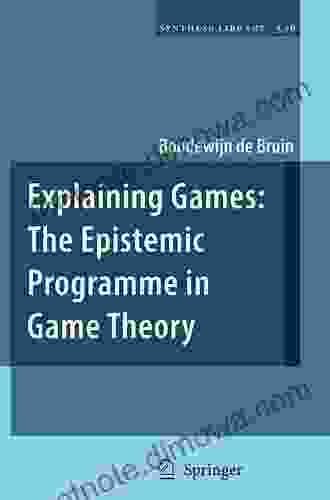Unlocking the Secrets of Strategic Decision-Making: The Epistemic Programme in Game Theory

In the realm of strategic decision-making, game theory has emerged as a powerful framework for understanding and predicting the behavior of rational agents. However, traditional game theory models often make simplifying assumptions about the players' knowledge and beliefs, which can limit their applicability in real-world scenarios.
The Epistemic Programme in Game Theory addresses this limitation by introducing epistemic dimensions into game models, allowing researchers to delve deeper into the cognitive and informational aspects of strategic interactions. This article provides a comprehensive exploration of this innovative approach, revealing its transformative impact on the field of game theory.
The Epistemic Programme is a research paradigm that incorporates epistemic logic into game theory, enabling the modeling and analysis of players' beliefs, knowledge, and information. Epistemic logic, a branch of modal logic, provides a formal language for representing and reasoning about knowledge and belief.
4.6 out of 5
| Language | : | English |
| File size | : | 4333 KB |
| Text-to-Speech | : | Enabled |
| Screen Reader | : | Supported |
| Enhanced typesetting | : | Enabled |
| Word Wise | : | Enabled |
| Print length | : | 196 pages |
By integrating epistemic logic into game models, the Epistemic Programme allows researchers to capture a wider range of strategic situations, including scenarios where players have imperfect or incomplete information, face uncertainty, and reason about the knowledge and beliefs of others.
The Epistemic Programme has several key features and concepts that distinguish it from traditional game theory models:
Belief Functions: Each player in an epistemic game has a belief function that assigns probabilities to different states of the game. These belief functions represent the player's subjective assessment of the game's outcome based on the information they have available.
Common Knowledge: Common knowledge refers to information that is known to all players and is also known to be known by all players, and so on. The concept of common knowledge plays a crucial role in epistemic game models, as it can create shared expectations and influence strategic decisions.
Epistemic Entrenchment: Epistemic entrenchment occurs when a player's belief is so strong that it cannot be changed, even in the face of new information. This concept captures the idea that certain beliefs are deeply held and resistant to revision.
Information Cascades: An information cascade is a situation where players make decisions based on the decisions of others, even though they may have access to different information. This can lead to irrational decision-making and suboptimal outcomes.
The Epistemic Programme has been applied to a diverse range of fields, including economics, political science, computer science, and biology. Here are a few examples of its applications:
Bargaining with Incomplete Information: The Epistemic Programme can be used to analyze bargaining situations where players have different beliefs about the value of the object being negotiated. This can lead to strategic delays, information sharing, and complex negotiation strategies.
Auctions with Endogenous Bidders: Epistemic game models can capture the behavior of bidders in auctions who have incomplete information about the value of the item being sold. This can lead to bidding strategies that differ from standard game theory predictions.
Belief-Based Planning: The Epistemic Programme enables the modeling of agents who plan their actions based on their beliefs about the future. This can be applied to decision-making in artificial intelligence, robotics, and strategic planning.
The Epistemic Programme offers several benefits and advantages over traditional game theory models:
Captures Cognitive and Informational Aspects: It allows for the modeling of players' beliefs, knowledge, and information, providing a more realistic representation of strategic interactions.
Handles Uncertainty and Imperfect Information: The Epistemic Programme can deal with situations where players have incomplete or imperfect information, making it suitable for analyzing real-world decision-making scenarios.
Facilitates Rational Decision-Making: By incorporating epistemic dimensions, the Epistemic Programme enables the analysis of how players reason and make decisions based on their beliefs and information.
Enriches Game Theory Theory: The Epistemic Programme deepens our understanding of game theory as a mathematical framework for analyzing strategic interactions, extending its applicability to a broader range of situations.
The Epistemic Programme is an active and vibrant area of research, with scholars exploring a wide range of topics, including:
Dynamic Epistemic Logic: This area explores the modeling and analysis of how players' beliefs change over time in response to new information and strategic interactions.
Epistemic Logic in Distributed Systems: The Epistemic Programme is being applied to analyze the behavior of distributed systems, where multiple agents communicate and coordinate with incomplete information.
Epistemic Games and Social Networks: Researchers are investigating the relationship between epistemic games and social networks, exploring how social connections influence players' beliefs and strategic decisions.
The Epistemic Programme in Game Theory represents a significant advancement in the field of game theory, bridging the gap between traditional models and the cognitive and informational dimensions of strategic interactions. By incorporating epistemic logic into game models, the Epistemic Programme empowers researchers to analyze a broader range of scenarios, capture the complexities of human decision-making, and deepen our understanding of strategic behavior. As research in this area continues, we can expect to see even more groundbreaking applications and insights emerging in the future.
4.6 out of 5
| Language | : | English |
| File size | : | 4333 KB |
| Text-to-Speech | : | Enabled |
| Screen Reader | : | Supported |
| Enhanced typesetting | : | Enabled |
| Word Wise | : | Enabled |
| Print length | : | 196 pages |
Do you want to contribute by writing guest posts on this blog?
Please contact us and send us a resume of previous articles that you have written.
 Book
Book Novel
Novel Page
Page Chapter
Chapter Text
Text Story
Story Genre
Genre Reader
Reader Library
Library Paperback
Paperback E-book
E-book Magazine
Magazine Newspaper
Newspaper Paragraph
Paragraph Sentence
Sentence Bookmark
Bookmark Shelf
Shelf Glossary
Glossary Bibliography
Bibliography Foreword
Foreword Preface
Preface Synopsis
Synopsis Annotation
Annotation Footnote
Footnote Manuscript
Manuscript Scroll
Scroll Codex
Codex Tome
Tome Bestseller
Bestseller Classics
Classics Library card
Library card Narrative
Narrative Biography
Biography Autobiography
Autobiography Memoir
Memoir Reference
Reference Encyclopedia
Encyclopedia Chuck Neighbors
Chuck Neighbors Todd Keene Timberlake
Todd Keene Timberlake Lana Stern
Lana Stern Christopher Miller
Christopher Miller Christopher J A Smith
Christopher J A Smith Katy Birchall
Katy Birchall W A Hawkes Robinson
W A Hawkes Robinson David H Lewis
David H Lewis Clark Wilkins
Clark Wilkins Patrick Hill
Patrick Hill Victor Villasenor
Victor Villasenor Jeff Zycinski
Jeff Zycinski Evelyn Tan
Evelyn Tan Stella Wilkinson
Stella Wilkinson Coach Jeff
Coach Jeff Kate Moira Ryan
Kate Moira Ryan Susan Gillis
Susan Gillis Wan Mohd Hirwani Wan Hussain
Wan Mohd Hirwani Wan Hussain Francis Reid
Francis Reid Cliff Jacobson
Cliff Jacobson
Light bulbAdvertise smarter! Our strategic ad space ensures maximum exposure. Reserve your spot today!

 Dwight BellUnlock French Fluency: The Ultimate English-to-French Dictionary and Grammar...
Dwight BellUnlock French Fluency: The Ultimate English-to-French Dictionary and Grammar... Glen PowellFollow ·14.2k
Glen PowellFollow ·14.2k Julio Ramón RibeyroFollow ·7.9k
Julio Ramón RibeyroFollow ·7.9k H.G. WellsFollow ·12.6k
H.G. WellsFollow ·12.6k Andres CarterFollow ·10.5k
Andres CarterFollow ·10.5k Arthur MasonFollow ·8.6k
Arthur MasonFollow ·8.6k Brennan BlairFollow ·13.6k
Brennan BlairFollow ·13.6k Italo CalvinoFollow ·10.1k
Italo CalvinoFollow ·10.1k Edgar Allan PoeFollow ·12k
Edgar Allan PoeFollow ·12k

 Howard Blair
Howard BlairThe Bewitching of Camille: A Mystical Tapestry of...
Prepare to be...

 Kirk Hayes
Kirk HayesUnraveling the Enigmatic Tale of "Vanished But Still...
In the labyrinth of memory...

 Joe Simmons
Joe SimmonsDogwild: An Unforgettable Literary Odyssey into the Heart...
Delve into the Untamed...

 Edgar Allan Poe
Edgar Allan PoeIndulge in Culinary Delights: Your Ultimate Costa Brava...
Discover the Flavors of Spain's Coastal...
4.6 out of 5
| Language | : | English |
| File size | : | 4333 KB |
| Text-to-Speech | : | Enabled |
| Screen Reader | : | Supported |
| Enhanced typesetting | : | Enabled |
| Word Wise | : | Enabled |
| Print length | : | 196 pages |














